
Introduction:
We have produced a Code of Conduct (“Code”) which demonstrates to our stakeholders, our commitment to a strong and unique company culture with solid ethical values. It requires all of us to act with integrity and apply the highest ethical standards in our daily work.
Our core values are based on three key principles:
- Performance
- Integrity
- Professionalism
1. Coverage
1.1 This Code applies across the entire Cargo Services Group, its subsidiaries, affiliates and associates (collectively known as “CS”). The policy applies to all individuals working at all levels and grades, including senior managers, officers, director, employees (whether permanent, fixed term or temporary), consultants, contractors, trainees, seconded staff, homeworkers, casual workers and agency staff, volunteers, interns, agents, sponsors, or any other person associated with the CS Group of Companies, wherever located (collectively referred to as employees in this policy).
1.2 In the case of joint ventures or companies in which the Company does not hold a controlling interest, the Company’s representatives concerned are expected to act in accordance with the Code themselves and to make a concerted effort to influence those with whom they are working to act to similar standards of integrity and ethical behaviour.
1.3 Contractors working for the Company are urged to follow our Code of Conduct for the duration of their contract with the Company. The Company will fully support those who pass up unethical opportunities or in good faith report potential or actual breaches of the Code.
2. Ethics and Business Integrity
2.1 We are committed to conducting business with integrity, in accordance with strong business ethics.
2.2 All our business must be conducted honestly and fairly, with no conflict of interest or undue influence.
2.3 We must be accurate and truthful in our dealings with third parties, and not misrepresent ourselves or the quality, features, price or availability of our products and services.
2.4 We must also be honest and forthcoming with our colleagues, prepare and offer honest business assessments, evaluations and proposals, and record accurately all transactions. If we make a business commitment, we will dedicate ourselves to ensure that we meet it.
3. Non-Retaliation and Confidentiality
3.1 We value the help of employees who identify potential problems that we need to address. CS will ensure that reports are kept confidential, including the identity of the reporter.
3.2 We do not tolerate retaliation of any kind against employees who, in good faith, report breaches or violations of our Code of Conduct or any other illegal conduct. We take claims of retaliation seriously. Allegations of retaliation are investigated and appropriate action is taken.
4. Compliance with Laws and Regulations
4.1 The Company’s activities are subject to the laws of different jurisdictions, statutory requirements and statutory codes.
4.2 Each of us is required to adhere strictly to both the letter and spirit of all applicable laws, regulations and statutory codes.
4.3 The laws that apply to particular international transactions and activities include those of the countries where the transaction occurs. The applicable laws also include certain laws of the jurisdiction, where we operate, governing international operations of the Company.
4.4 Each of us is expected to co-operate fully in the investigation of any alleged violation of the law or Company policy. Concealing a violation or altering or destroying evidence may be illegal and will be treated as a serious breach of the Code.
5. No Bribery
5.1 The Company is committed to abiding by all laws and regulations, and to prevent bribery wherever we do business.
5.2 The Code forbids paying, offering, asking for, proposing terms for, or accepting, bribes directly or with the assistance of any organisation or individual. We are strictly prohibited from discussing terms with people who ask for or offer bribes.
5.3 For details of the policy, please refer to “Anti-bribery and anti-corruption policy”.
6. Moderation in Gifts and Entertainment
6.1 We must decline entertainment, gifts or other benefits (e.g., personal favours, or preferential treatment) that could in any way influence, or appear to influence, business decisions in favour of any person or organisation with whom the Company may have business dealings.
6.2 We are also under an obligation to ensure agents or others providing gifts or entertainment on the Company’s behalf follow our guidelines “Anti-bribery and anti-corruption policy”.
7. Charitable donations and sponsorships
7.1 CS makes charitable donations from time to time, normally in the form of sponsorship to support someone’s endeavours (and is donated via “just giving”) in activities or where a location gets involved in things such as Red Nose day or Jeans for Genes where we often match sums raised by staff.
7.2 We do not make contributions to political parties. We only make charitable donations that are legal and ethical under local laws and practices.
8. Competition and Anti-trust
8.1 We strictly adhere to what are called “competition” laws in some countries and “anti-trust” laws in others. These laws promote or protect free and fair competition around the world and prohibit all anti-competitive behavior, such as price-fixing conspiracies.
8.2 No CS employee is permitted to engage in price-fixing, bid rigging, allocation of market or customers, or similar illegal anti-competitive activities.
8.3 The Company only uses available expert-, industry- and other publicly available sources to understand business, customer and supplier strategies, technology trends, regulatory proposals and developments, and existing and expected actions of suppliers and competitors.
8.4 CS gathers this information fairly and legally and never by dubious means such as theft, illegal entry, bribery, misrepresentation of who you are or electronic eavesdropping.
9. Contract Compliance
9.1 We comply with all terms and conditions of our contracts and expect our business partners to do the same. We deliver as we promise, and bill in strict compliance with contract terms.
10. Confidentiality
10.1 The employee shall not at any time, either during or after the termination of his employment agreement, divulge or communicate to any person or persons (except to those officials of the Company whose province it is to know the same) any of the secrets or any other information which he may receive or obtain in relation to the private affairs of the Company or to the working of any process, system or invention which is carried on or used by the Company or which he may make or discover during his/ her appointment and shall not use for his/ her own purposes nor for any purposes other than those of the Company any information or knowledge of a confidential nature which he may from time to time acquire in relation to the Company.
10.2 All lists, accounts, schedules, correspondence, files and other documents, papers and property, which may have been prepared by the employee or have come into his/ her possession during the course of the employment, belong to the Company. The information shall be handed over by the employee to the Company from time to time, on demand, and in any event immediately upon the termination of this agreement with the Company and the employee shall not retain any copies thereof.
10.3 The Company prohibits any staff from transferring sensitive materials and information, and intellectual property of the Company to those of third parties, without the express approval of the Senior Management.
11. Avoid Conflict of Interests
11.1 In our daily activities we work with suppliers, customers and others who do business with CS. It is important that every decision is made with objectivity and is based on the needs of the company and not on personal interests or relationships.
11.2 The Company respects the right of employees to engage in outside activities, including business interests but they must declare the interests and obtain pre-approval from senior management.
11.3 It is imperative that all employees shall protect the Company’sbest interests at all times and avoid work which endangers the proprietary position of the Company.
11.4 Employees must declare to the Company any financial interest, direct or indirect, which they or members of their immediate family may have, in any business or other organisation which competes with the Company or with which the Company has business dealings.
12. Ethical Sustainability
12.1 The Company commits to creating a safe, fair and socially responsible working environment and complying with the Ethical Trading Initiative (“ETI”).
12.2 Having adopted the ETI base code, a programme of independent audits has been introduced to measure Ethical and Social compliance within our global network. Our customers, colleagues and the experience we can draw from within the ETI will determine how our program evolves.
12.3 Our Commitment:
12.3.1 Employment is freely chosen
12.3.2 Freedom of association and the right to collective bargaining are respected
12.3.3 Working conditions are safe and hygienic
12.3.4 Child labour shall not be used
12.3.5 Living wages are paid
12.3.6 Working hours are not excessive
12.3.7 No discrimination is practised
12.3.8 Regular employment is provided
12.3.9 No harsh or inhumane treatment is allowed
13. Risk Management
13.1 As an internationally operating logistics company, we are continually confronted with changes. Our management regularly assesses the impact of future scenarios and evaluates the opportunities and risks in their departments. Risks can also be reported at any time on an ad hoc basis.
13.2 Our early identification process leads to uniform reporting standards for risk management in the Company. The risk management process is also used to ascertain potential risks in the areas of environmental management, litigation or personnel. We make continuous improvements to the IT application used for this purpose.
14. Prompt Response to Incidents and Obligation to Notify
14.1 CS is committed to responding promptly to business and work-related situations that could be damaging to the Company or cause harm to others such as emergencies, accidents, irregularities or other unexpected events.
14.2 The Code requires each of us to promptly notify our supervisor or higher management of these situations and take reasonable action to prevent damage or harm. Situations covered are those that may result in: injury, illness or loss of life; damage to property or the environment; violation of the law or other applicable regulations; interruptions of service; and failure to meet the Company’s obligations.
15. Reporting of Breaches
15.1 Interpretation of the Code and Other Queries
15.1.1 Advice regarding interpretation of the Code may be obtained from Head of Internal Audit or Head of Quality Assurance.
15.1.2 The Company values the input of every employee on matters relating to the Code. We also value input from our business partners, suppliers and other external parties. If you have any queries concerning any aspect of the Code, please do not hesitate to contact Head of Internal Audit or Head of Quality Assurance directly or through local Human Resources representatives.
15.2 If you have reason to believe that any CS employee or anyone working on behalf of CS has engaged in ethical or legal misconduct, you are required to report the incident promptly. You can talk to your manager, or Head of Internal Audit or Head of Quality Assurance.
15.3 Each of us has an obligation to fully comply with its provisions and promptly report ethical concerns and potential or actual violations of the Code, whether or not it is known who may be responsible for the violation or how it may have occurred. We could be in breach of the Code if we assist or authorise others in activities that breach the Code, or conceal or fail to report any known or suspected breaches by others.
15.4 Any types of potential actual violations of the Code must be reported to the Head of Internal Audit or Head of Quality Assurance. Alternatively, one may prefer to initially report to his/her manager or local Human Resources representatives who must in turn report to Head of Internal Audit or Head of Quality Assurance. Business partners, suppliers and other third parties are encouraged to report any violations directly to Head of Internal Audit or Head of Quality Assurance.
15.5 As the Company takes this reporting seriously and wants to fully investigate both potential and actual violations, it is preferred that these reports not be made anonymously. All reports and inquiries will be handled confidentially to the extent possible under the circumstances to preserve anonymity.
15.6 Anyone found violating the Code will be subject to disciplinary action which may include dismissal.
15.7 Anyone initiating or threatening to initiate retaliation against a complainant or informant, will be subject to disciplinary action which may include dismissal.
Quality Assurance

Cargo Services Group believes delivery of high-quality and safe series, fair price and customer satisfaction are critical factors for sustaining long term business success and opportunity.
Cargo Services Group has created a quality and compliance framework comprising of: ISO 9001 Quality Management System, ISO 28000 Security Management System for Supply Chain, ISO14001 Environment Management System, Ethical Trading, Anti-Bribery and LEAN, becoming one of the leading integrated logistics service providers to certify its entire system globally.
In June 2015 Cargo Services Group initiated ‘Project New Life’. Following lean management concepts and DMAIC methodology; this is a vital global strategy to make our operations as lean and efficient as possible.
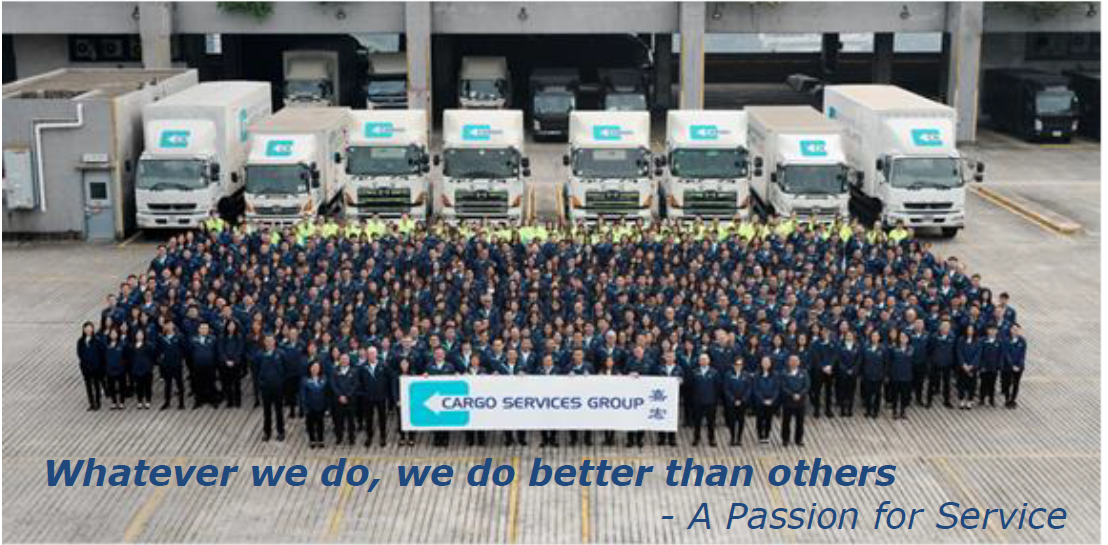
Quality Statement
Quality means providing services to all our customers and agents in strict compliance to agreed KPI and customary practice of the highest standard in the industry, and aiming at daily improvements to exceed expectations of customers.
Quality improvement is the responsibility of every staff of Cargo Services Group.
We will always strive to meet all the requirements of ISO 9001 and to continue to improve in the quality of our services and enhance our Quality Management System.
Accreditation
ISO 9001
DNV
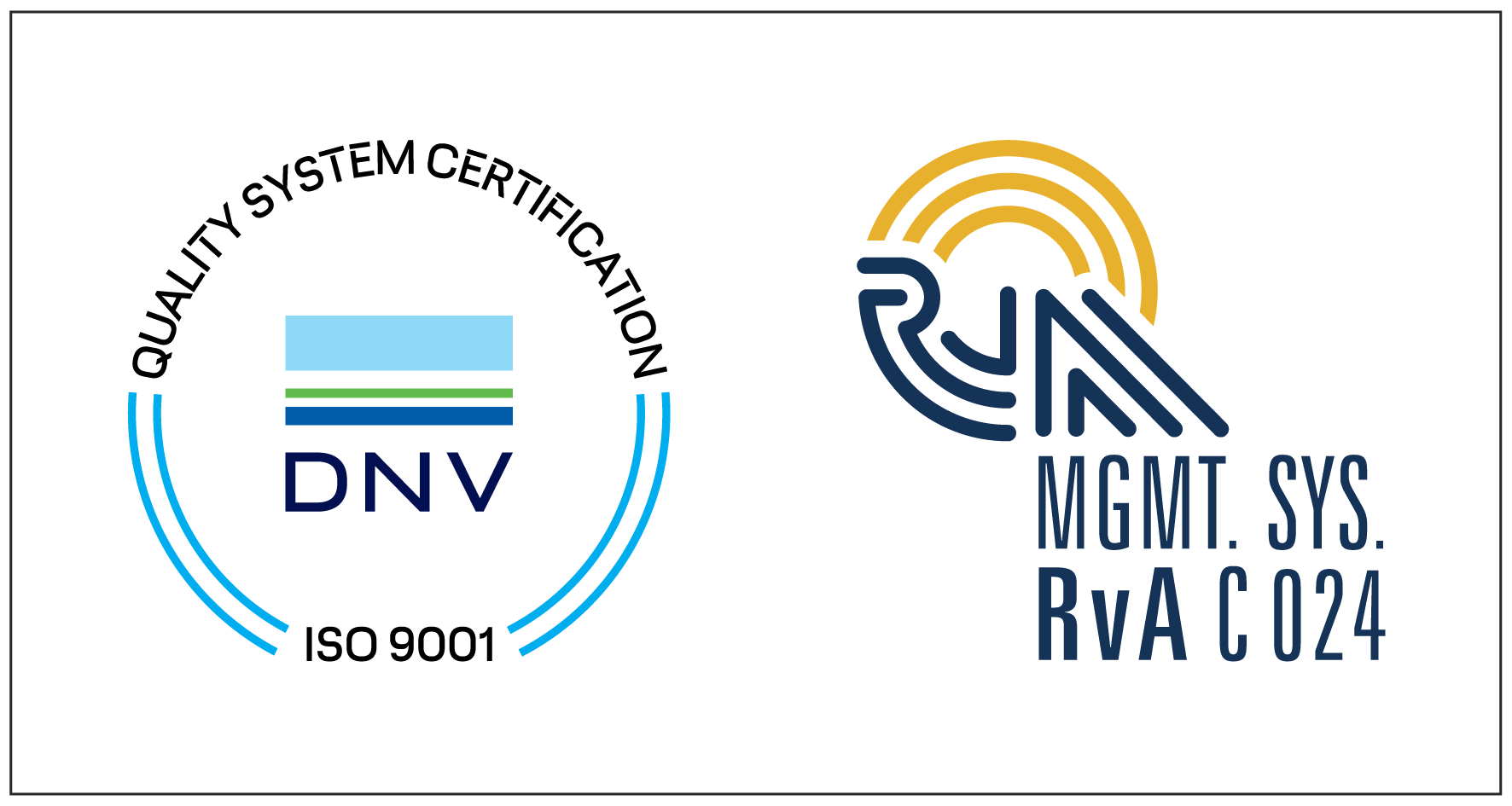

Security Management Policy
For the continual improvement of the security aspects of our security management system and for the benefit of our employees, customers and local community, Cargo Services Group are committed to the implementation and continual improvement of security practices throughout their operations by:
Top Management is committed to:
- Identifying all possible threats of attack to its organisation – from internal as well as external sources, such as drug trafficking, terrorism, human smuggling, and illegal contraband
- Analyzing the risk posed by these possible threats
- Identifying and implementing actions to eliminate these risks or to reduce them to an acceptable level
- To comply with C-TPAT and ISO 28000:2007 requirements
- To comply with current applicable legislation, regulatory and statutory requirements and with other requirements to which the organisation subscribes
- To ensure all security procedures are documented as a policy or procedure
- To review all the security policies every 12 months and update the policies if necessary
This Policy guides the Management and employees at all levels in the organisation to be focused to the supply chain security and ensure the constant improvement of the security management system.
Accreditation
ISO 28000:2007
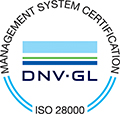
C-TPAT Certification
SGS

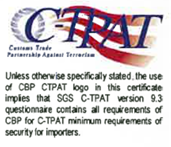
U.S. Customs and Border Protection
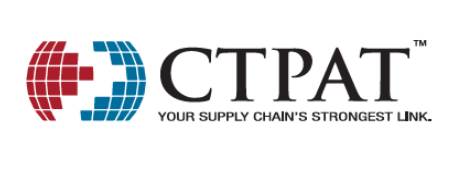

Environmental Policy
Cargo Services Group is committed to the protection of the environment, prevention of pollution, compliance with current environmental legislation and fulfilment of our compliance obligation. We integrate ISO14001:2015 Environmental Management System (EMS) practices in our business processes.
Top Management is committed to:
- Ensure that good environmental management is an integral part of our business culture by communicating the EMS policy to all employees
- Strive to ensure that all employees, contractors, customers and members of the public are aware of the environmental impacts of our business
- Report and audit our environmental performance as a means to improve accountability and to drive continual improvement of our EMS
- Ensure that employees and other interested parties are made aware of their individual responsibilities contained within our EMS by effective communication
- Ensure that the relevant needs and expectations of interested parties are considered and met if deemed to be compliance obligation
- Maintain a high level of awareness of sustainability issues amongst our employees and integrate environmental management into training
- Continually improving on our EMS performance by active participation of our entire employee
This policy statement is used as the basis for setting and reviewing environment, health and safety objectives. The Environmental Management System is fully documented, implemented and maintained.
Accreditation
ISO 14001:2015
DNV-GL

Hong Kong Green Organisation Certification
Environmental Campaign Committee
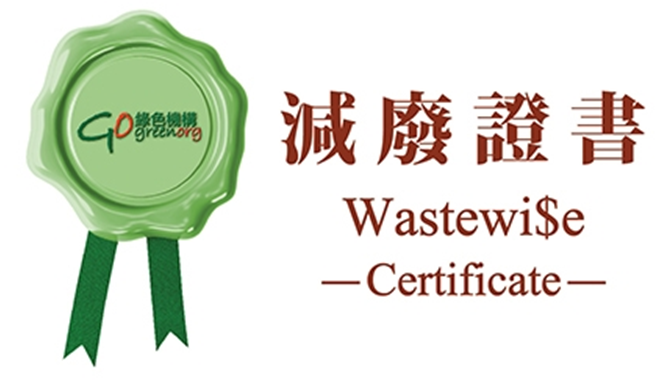


Ethical Trading Commitment
Cargo Services Group commits to creating a safe, fair and socially responsible working environment and complying with the base code of Ethical Trading Initiative (“ETI”).
Our Commitment:
1. Employment is freely chosen
1.1. Cargo Services shall comply with the local laws and regulations in all process of employment and management and shall not be against law or deliberately conflict with the genuine purpose of the law.
1.2. Cargo Services shall not use forced labour, child labour, slave labour, prison labour or bonded labour.
1.3. Workers (including trainees/apprentices/workers-in-probation) are not required to pay deposits or lodge identification documents upon commencing employment.
1.4. Neither Cargo Services nor any agency supplying labour shall withhold any part of any personal’s salary, benefits, property to force them continue working.
1.5. Workers are given the right to leave workplace premises after workday and to be free to terminate employment with reasonable notice.
2. Regular employment is provided
2.1. Cargo Services shall engage workers based on recognized and documented employment relationships.
2.2. Cargo Services shall provide workers with understandable information before employment.
2.3. Cargo Services shall use certified agents, brokers when dispatched workers needed.
3. Freedom of association and the right to collective bargaining are respected
3.1. Workers are free to join trade union or other worker associations of their choosing.
3.2. Cargo Services shall communicate to workers on their rights to freely join union or other worker organization of their choosing (without negative consequence or retaliation).
3.3. Workers are given the rights of collective bargaining with the Company where the right is allowed by law.
3.4. Cargo Services shall not interfere with the establishment and administration of such workers’ organizations or collective bargaining. Worker representatives could access to their members in the workplace.
3.5. Cargo Services shall allow workers to freely elect their own representatives.
3.6. Cargo Services shall not engage in disparate treatment between union and non-union workers.
3.7. Workers representatives engaged in workers’ organization / trade union are not subject to harassment, intimidation, or retaliation for reason of the representative status or participation in trade union activities.
3.8. Worker can communication grievances – including but not limited to those related to working hours, working conditions, harassment – directly to management or management representatives without fear of reprisal.
4. Working and living conditions are safe and hygienic
Health and safety in working and living areas
4.1. Cargo Services shall provide a healthy and safety working environment and related occupational training to workers.
4.2. Cargo Services shall take step to prevent accidents and injury to employees in case of prevailing local conditions (e.g. civil unrest, strike, demonstration) by sending out an alert to all employees in advance.
4.3. Cargo Services shall maintain up-to-date all legally required permits, licenses, test reports for health and safety at the workplace.
4.4. All site building, including dormitories (if applicable) are maintained in good condition without posing a threat to the health of workers.
4.5. Working environment must be kept clean and tidy, at a comfortable temperature, with adequate ventilation, lighting and space.
4.6. Where relevant, Cargo Services shall conduct risk assessment to identify and control the hazards to workers.
4.7. If required, appropriate Personal Protective Equipment (PPE) provided at the company’s costs and in an acceptable condition.
4.8. Training is provided to workers on safety procedures (including the use of PPE) prior to job assignment or when the job assignment changed.
4.9. Adequate first aiders are in place to provide treatment for injured or ill workers.
4.10. Cargo Services shall maintain adequate first aid kits at all floors of workplace and the dormitory facilities (if any). And, the first aid kits are clearly marked, and the content are within the expiry date, applicable and replaced when used.
4.11. Accidents at work are reported and recorded. Investigations to determine root cause(s) and implement corrective / preventive actions for work-related injuries / illness in the past 12 months are performed and documented.
4.12. Potable water is clean, accessible and adequate for workers.
4.13. Lavatory facilities are accessible, clean and reasonable in number at each floor and segregated per gender, and with relevant privacy.
4.14. Canteens (cafeterias) are clean, well maintained, and managed in compliance with local health regulations with required permits and certificates, including canteen staff health certificate.
4.15. Food service workers have undergone appropriate food safety training and obtained health certificates.
4.16. Dormitory facilities are separated from production building and/or warehouse.
4.17. Dormitory facilities are clean, safe and meet basic needs per local regulations and culture.
4.18. All exits are always unblocked and unlocked for emergency evacuation in all facilities.
4.19. Workers are free to exit and re-enter dormitory freely.
Machinery and equipment safety
4.20. All legally required permits, licenses and testing reports for machinery / equipment are in place and maintained up to date.
4.21. Maintenance of machinery and equipment is undertaken regularly, and records are kept for the legally required period.
4.22. All electricians, welding operators and forklift drivers and other employees who operate special equipment are trained and qualified by local regulations.
4.23. Electrical installations and wirings connected to machinery are checked periodically and repairs carried out by qualified electrician.
4.24. Appropriate warning signs and written instruction are in place for the operators of machinery.
4.25. Workers have been certificated by relevant authorized organization for handling and maintenance of machinery / equipment (Generator, boilers, elevators, pressure vessels, etc.)
4.26. Adequate and effective machine safeguards are installed.
4.27. Workers are trained to operate machinery, including proper use of machine safeguards and emergency stop switches.
Fire safety and emergency
4.28. Adequate number of fire extinguishers and or other fire extinguishing system shall be installed in each building (including the dormitories).
4.29. Emergency exits, aisles and stairways are adequate in number and location, easily accessible, and properly maintained.
4.30. Exit signs in local language and functional emergency lighting shall be located to guide the evacuation path.
4.31. There are adequate evacuation plans on each floor of the facility.
4.32. Emergency evacuation / response drills are conducted with records for all workers (at all shifts) at the regular interval per law or annually (whichever is higher).
4.33. Fire detection, alarm and suppression systems (e.g. fire extinguishers, fire alarms, hydrant, sprinkler, smoke detector) are installed and functional, accessible per local laws.
4.34. Fire equipment shall be inspected regularly with records.
4.35. Workers are trained on response to different types of emergencies (e.g. earthquake, floods) identified by the Company.
Chemical safety
4.36. All chemicals shall be stored in appropriate containers and labelled with name and hazards correctly. A secondary container shall be used if leakage of the primary container is possible.
4.37. Hazardous materials / chemicals are only accessible to competent employees.
4.38. Corresponding Material Safety Data Sheet (MSDS) and warning/’No Smoking’ sign shall be made available for all stored chemicals.
4.39. Hazardous materials and wastes shall be categorized, labeled, handled, stored, transported and disposed as per local laws.
4.40. Training to the responsible personnel for chemical handling, (including MSDS content) shall be provided before job assignment and on a regular basis.
5. Child labour shall not be used
5.1. Cargo Services shall not employ child labour (under local minimum age of employment).
5.2. Cargo Services shall have effective procedures to verify the age of employees at the time of recruitment.
5.3. Cargo Services shall maintain complete employment records which include proof of employees’ ages at recruitment. (e.g. copy of identity card)
5.4. The employment of young workers (if any) is in accordance with applicable local laws.
5.5. Young workers are not involved in hazardous work.
5.6. Young workers are not employed night shift.
6. Living wages are paid
6.1. All wages shall be paid in a timely manner as per local law.
6.2. Workers (including trainees/apprentices/workers-in-probation) shall be provided a weekly or monthly salary of no less than the legal minimum wage required by any government of the country.
6.3. Workers shall be compensated at a premium rate for all overtime hours as defined by local law, or at a premium rate of prevailing industry standards if not defined by local laws.
6.4. Cargo Services shall provide legally mandated benefits (including social insurance) to all workers.
6.5. Wage deductions shall be made only as permitted by local laws.
6.6. Cargo Services shall not use labour-only contracting arrangements, consecutive short-term contracts, and/or false apprenticeship schemes to avoid fulfilling its obligations to personnel under applicable laws pertaining to labour.
6.7. Cargo Services shall pay maternity and paid leaves under applicable laws and regulations.
6.8. Cargo Services shall maintain complete and accurate payroll/wages records for all workers that reflect the actual remuneration/payment.
6.9. All labour suppliers are required to comply with our social accountability policy and their performance is subject to review on regular basis.
7. Working hours are not excessive
7.1. Cargo Services shall provide reasonable working hour and legally required benefits to all employees.
7.2. Cargo Services shall ensure workers’ overtime hours within the legal limits, and workers shall be assigned overtime on a voluntary basis.
7.3. Time recording devices (e.g. punch time cards, swipe cards) shall be reliable and accurate to ensure effective monitoring of working hours.
7.4. Workers shall be guaranteed at least one rest day every 7-day working period (or 2 days off within 14 days where applicable).
7.5. Cargo Services shall provide workers with annual leave, public holiday and paid leave as mandated by local laws.
8. No discrimination is practiced
8.1. Workers shall not be subject to any discrimination in employment, including hiring, salary, benefits, advancement, discipline, termination or retirement, on the basis of gender, race, religion, age, disability, sexual orientation, nationality, political opinion, family responsibilities, marital status, or social or ethnic origin.
8.2. Cargo Services shall not interfere with the exercise of workers’ rights to observe tenets or practices, or to meet needs relating to race, national or social origin, religion, disability, gender, sexual orientation, family responsibilities, union membership political opinions or any other condition that could give rise to discrimination.
8.3. Workers shall not be subject to pregnancy or virginity tests under any circumstances.
8.4. Cargo Services shall provide workers with confidential means for raising their grievances about their discrimination situation.
8.5. Female workers shall be entitled same level of salary as male workers in terms of same tasks.
9. No harsh or inhumane treatment is allowed
9.1. Cargo Services shall forbid and avoid mental / physical / sexual coercion.
9.2. Cargo Services shall have effective procedures for conducting investigation and resolution process when incidents of physical / sexual abuse or discipline reported.
9.3. Workers are not subject to any corporal punishment, mental or physical coercion or verbal abuse.
9.4. Cargo Services shall not allow any policy / practices that are threatening abusive, exploitative, or sexually coercive, including gestures, language, and physical contact in the workplace and residences provided by the Company.
10. Environment
10.1. Cargo Services shall contribute environmental protection and implement daily management in comply with laws and regulations.
10.2. Cargo Services has obtained all the legally required environmental permits, approvals, licenses and regulations.
10.3. Solid waste is managed and disposed in accordance with applicable legal requirements.
10.4. Air emission is monitored within the discharge limits for regulated constituents.
10.5. Effluent discharges (industrial/process wastewater, sewage and storm water) are monitored within the discharge limits for regulated constituents.
10.6. Environmental noise level is monitored within regulatory limits.
10.7. Cargo Services shall adequately separate recyclable from non-recyclable wastes in workshops/warehouse.
10.8. Cargo Services shall take actions to reduce/recycle/re-use solid waste as much as possible and document the actions.
10.9. Hazardous wastes shall be stored in a relevant way, closed, with control access and ensured it cannot spill.
10.10. Hazardous wastes shall be transferred to 3rd party with relevant certifications, and company shall keep record of wastes transfer.
10.11. Cargo Services shall monitor the energy and water use. Programs and targets are in place to continually improve efficiency in utilization of resources (energy, water, materials such as paper).
Having adopted the ETI base code, a programme of independent audits has been introduced to measure Ethical and Social compliance within our global network. Cargo Services joined Sedex as a Supplier (B) member in July 2020. We proceed SMETA audit for all our warehouses every year.


Anti-Bribery and Anti-Corruption Policy
A. Definitions and Interpretations
1. The following terms shall be defined and/or interpreted as follows:
a. There is no globally accepted definition of Bribery and Corruption, however:
i. Bribery shall mean the direct or indirect giving, offering, promising or receiving of anything of value with the intention of improperly influencing the behaviour or decision-making of any person in order to obtain, or retain, an advantage, or the rewarding of any person for such behaviour;
ii. Corruption shall mean, the dishonest or fraudulent misuse of power or the improper performance of a function which is of a public nature, connected with a business, performed in the course of employment, and/or any function performed by or on behalf of a body of persons (incorporated or unincorporated).
b. Employees shall mean, all individuals working at all levels and grades within Cargo Services, whether full-time or part-time, regardless of location, including, directors, senior managers, officers, consultants, trainees, seconded staff, homeworkers, casual workers, agency staff, volunteers, interns, agents and sponsors;
c. Public Officials shall include, but are not limited to:
i. Public or government officials, agents, employees, or representatives;
ii. Any political party or political party officials, agents, employees or representatives;
iii. Candidates for public or political party office;
iv. Members of public assemblies;
v. Officials and employees of international organisations (e.g. the United Nations, the World Bank or the IMF);
vi. Judges or officials of international courts; and
vii. Government controlled administrations’ and state owned companies’ employees.
Third Parties shall mean, any individual or organisation you come into contact with during the course of your work for Cargo Services, and includes actual and potential clients, customers, suppliers, distributors, business contacts, agents, advisers, and government and public bodies, including their advisors, representatives and officials, politicians and political parties;
d. A Gift shall mean any payment, gratuity, gratification, present or advantage (pecuniary or otherwise), offered or received, and include:
i. Presents, goods, equipment;
ii. Personal discounts, commissions or other forms of remuneration;
iii. Cash, gratuity, payments, loans or advances or cash equivalents like gifts certificates, gift vouchers, shopping cards;
iv. Stocks, shares, equities; and
v. Free services, for instance insurance, tuition fees, repair or improvement works or any preferential treatment.
e. Hospitality shall mean, any form of social amenity, entertainment, travelling and accommodation or any invitation offered or received and includes:
i. Meals: breakfast, lunch, dinner, cocktails, receptions;
ii. Hotel accommodation;
iii. Travel and trips by car, air, train or boat;
iv. Seminars, conventions; and
v. Invitations to sporting, cultural or social events.
B. Background
2. At Cargo Services, we are committed to carrying out our business activities in an ethical and lawful way.
3. We take a zero-tolerance approach to bribery and corruption and we are committed to acting professionally, fairly and with integrity in all our business dealings and relationships wherever we operate.
4. Any local laws, customs or practices which condone, permit or overlook bribery or corruption below a threshold are to be disregarded for the purpose of compliance with this policy.
5. The purpose of this policy is to:
a. Set out our responsibilities and minimum standards;
b. Set out the responsibilities of those working for us; and
c. Provide information and guidance to ensure compliance with all relevant laws and regulations including the Prevention of Bribery Ordinance (“POBO”), the US Foreign Corrupt Practices Act 1977 (“FCPA”) and the UK Bribery Act 2010 (“UKBA”).
6. We expect our business partners and suppliers to adopt standards which match our own when engaged in business with Cargo Services or when acting on our behalf.
7. This policy outlines what the company deems to be acceptable and unacceptable behaviour in order to protect our reputation and ensure compliance with anti-corruption legislation. It does not substitute the need for you to apply your own good judgment and common sense because it cannot cover every scenario that may arise.
8. For the avoidance of doubt, Cargo Services will not impose any penalty on an employee who complies with Cargo Services’ rules by refusing to engage in any form of bribery and corruption, even if such a decision results in losing business or any other adverse commercial consequences.
9. All employees, business partners and suppliers are strongly encouraged to raise any questions, doubts or concerns relating to any aspect of this policy in accordance with paragraphs 69 – 71, below.
C. Application
10. This policy applies to Cargo Services; its subsidiaries, associates, and minority companies; employees of these entities (see definition above); and any other person associated with these entities, wherever located.
D. Facilitation Payments
11. Facilitation Payments are usually unofficial payments to public officials made for the purpose of securing, facilitating or expediting the administrative performance of routine governmental actions (for example, issuing permits or licenses, immigration controls or releasing goods held in customs) and are sometimes referred to as ‘speed’ or ‘grease’ payments.
12. Whilst some local written anti-bribery laws permit such payments, as indicated above such laws are to be ignored for the purposes of this policy – Cargo Services’ policy is to prohibit such practices.
13. Sometimes these payments are demanded in a threatening way. If you believe that you (or anybody else) would be in danger if you don’t make a payment, we would not expect you to refuse to make it. If you do make a payment in these circumstances, you must inform the Senior Manager – Quality Assurance as soon as possible (contact details can be found at the bottom of this policy).
14. Assuming the payment was made in response to a threat to life, safety, or health, the circumstances likely would not result in disciplinary action.
E. Gifts and Hospitality
15. Offering or accepting reasonable, and proportionate, gifts and hospitality constitutes accepted practice and is part of establishing, and maintaining, good business relationships. Nevertheless, it is important to recognise that certain gifts and instances of hospitality may be perceived as excessive, or otherwise improper. As a result, all employees must give prior careful consideration to the nature of, and intention behind, each proposed gift and instance of hospitality (whether to be offered or received).
16. According to their position, some employees will face this situation more often than others. In particular, it is critical that employees having direct relationships with customers or suppliers, including public officials, sub-contractors, business partners, agents, consultants, representatives, regulating bodies or authorities, media or any other third party, are fully informed and comply with this instruction. This applies regardless of whether the gifts and hospitality are offered or given directly or through an intermediary.
17. We are a people-based business and therefore reasonable hospitality and the giving of modest gifts in a normal business setting is acceptable. However, we want to be successful in business for the right reasons. A payment or provision of a gift intended to improperly influence a decision maker is not how we win business and is not permitted in law (see the definition of Bribery and Corruption, above).
Considerations
18. We recognise that, in some cultures, good business relations may sometimes involve the exchange of symbolic gifts and hospitality.
19. The basic question to ask when considering whether a proposed gift and instance of hospitality (whether to be offered or received) could be viewed as improper is:
“Is the gift or hospitality:
(i) proportionate, reasonable and not unduly extravagant given the circumstances; and
(ii) offered without any illegal and/or otherwise unethical intention?”
20. If the answer is “Yes” to both parts of the basic question, such gift or hospitality is unlikely to breach anti-bribery and anti-corruption laws.
21. If the answer to either question is “No”, the employee should not offer or accept the gift or hospitality, even if it falls within the authorised limits described below.
22. To ensure that a proposed gift or instance of hospitality is not viewed as improper, all employees must abide by the principles and prior approval requirements set forth below.
Guiding Principles
23. The following guiding principles should be kept in mind:
a. No Advantage: Any gift or the granting of any form of hospitality must not be made with the purpose of obtaining, in breach of the recipient’s duties, an advantage of any kind or to influence the outcome of a business decision. The same applies when receiving a gift or benefiting from a hospitality;
b. Reasonable Value: Gifts and hospitality are intended to be mere expressions of courtesy. They should be limited to a reasonable value. Determining what is reasonable can vary from a country to another according to standards of living and local customs. The hierarchical level of the giver and of the receiver is also a criterion to be taken into consideration;
c. On Behalf of Cargo Services: Gifts and hospitality are provided on behalf of Cargo Services and paid for by Cargo Services. When the purpose is a professional relationship, no employee can pay for the gift or hospitality personally;
d. Frequency: Expensive gifts and hospitality offered, or given, to a third party must remain exceptional;
e. Occurrence: Offering or receiving a gift or hospitality is prohibited at critical periods when important business decisions are made. For example, during a bidding process, before or just after a contract is signed, when a contract is renegotiated, and when a claim occurs;
f. Reciprocity: Given that gifts and hospitality do not have the purpose of influencing a business decision and as they must be of a reasonable, modest or symbolic value, reciprocity is a key element to evaluating whether the gifts and hospitality offered, or received, are appropriate;
g. Transparency: Gifts and hospitality should not be given, or received, covertly and all expenses and receipts related to gifts and hospitality must be properly recorded.
Prior Approval Requirements Regarding Gifts and Hospitality
24. In respect of the following categories of individual, an employee must obtain prior written approval from the compliance designee before giving or receiving a gift or hospitality:
a. Public Officials
i. Any gift or hospitality of any value offered to or by a Public Official of any kind must be approved in writing in advance, with the exception of:
– Modest refreshments (e.g., soft drinks, coffee, tea, sandwiches, etc.) offered in connection with a business meeting;
– Items of nominal value (e.g., logo cups, hats, shirts, USB drives, calendars and notebooks which bear a company or other official logo) that are generally distributed by the company to its clients, vendors and others as a token of goodwill or for promotional purposes.
b. Private Individuals
i. Any gift or hospitality offered to, or by, an individual who is not a Public Official in circumstances in which that individual is a representative of a potential client, a competitor, or any other interested party involved in an ongoing procurement process, or in which Cargo Services is otherwise in the process of actively seeking to secure a contract;
ii. In all other circumstances, a gift or hospitality offered to, or by, an individual who is not a Public Official of a value exceeding
$150 USD, or the foreign currency equivalent (referred to herein as the “Threshold Amount”), must be approved, in writing, in advance.
25. If you are unsure about a particular situation involving the receipt of provision of gifts and hospitality, you should not hesitate to seek advice from the Cargo Services Group Senior Manager – Quality Assurance, and you are encouraged to do so by Cargo Services.
Examples of Permissible Instances of Offering Gifts and Hospitality
26. The giving or receiving of gifts and hospitality is a customary way to strengthen business relationships and, with some restrictions, is a lawful business practice.
27. The following categories of gifts and hospitality are permitted, as long as they are compliant with the rules and principles above:
a. Symbolic gifts with, for instance, the Cargo Services logo;
b. Usual and reasonable business meals e.g. modest breakfasts or lunches;
c. Meals attended by Cargo Services employees and someone with whom Cargo Services regularly does business or someone who is a prospective client;
d. Occasional attendance at ordinary sporting or other entertainment events by Cargo Services employees and someone with whom Cargo Services regularly does business or someone who is a prospective client; and
e. Modest gifts or tokens of goodwill (such as a bottle of wine or bouquet of flowers) following completion of a transaction/matter or during festivals, holidays or other special occasions, provided that: (i) the total value of such gift or hospitality falls below the Threshold Amount; and (ii) the gift or hospitality is offered without illegal intention;
f. ‘Red pocket money’ and gifts not exceeding the equivalent of £200 presented to employees during Chinese New Year, Christmas, Eid or any other local festive occasion when gifts are traditionally exchanged.
28. All items and activities must be compliant with all Cargo Services policies and procedures, and alcohol abuse in the course of providing business hospitality is to be avoided.
29. Hospitality must have a clear business reason, and not just be for the receiver’s, or their relatives’, personal enjoyment.
30. It is important to monitor and record frequent low value gifts and hospitality so as to ensure that, when all such instances of gifts and hospitality (for the same client or other individual or body), are taken together, the hospitality does not become disproportionate, unreasonable or unduly extravagant.
What is not Acceptable?
31. Cargo Services forbids receiving or offering the following categories of gifts and hospitality:
a. Personal discounts, commissions or other forms of remuneration;
b. Cash, payments, loans or advances, or cash equivalents like gifts certificates, gift vouchers, shopping cards, or even equities and shares;
c. Free services like insurance, tuition fees, repair or improvement works or preferential treatment;
d. Holiday or leisure packages;
e. Sex-related activities or any activities violating fair treatment principles for human beings;
f. Gambling activities; and
g. All export prohibited goods or illegal items.
32. For the avoidance of doubt, this is in no way intended to prohibit the giving by Cargo Services, or the receiving by Cargo Services employees, of gifts in order to reward loyalty and/or performance (for example, for long service to Cargo Services).
33. Employees are prohibited from requesting benefits of any kind from existing, or prospective, business partners; this is not ethical and may be unlawful. We do not encourage or permit such behaviour.
Recordkeeping Concerning Gifts or Hospitality
34. In order to promote and ensure transparency with regard to Cargo Services’ policy regarding gifts and hospitality, it is critical that Cargo Services maintains a complete, accurate and timely record of all gifts and instances of hospitality that employees have offered and received which fall within the requirements for pre-approval set out above (see para. 24).
35. To achieve such transparency, all employees of Cargo Services must comply with the following policy with regard to record-keeping.
36. Details (including estimated/actual value) of all gifts and hospitality offered or received by an employee that have required and received written approval in accordance with this provision must be recorded in the following way. The employee concerned must complete an Cargo Services Report on gifts/advantages received (Form: CS-ADM-013-01) and submit it to the Cargo Services Group Senior Manager – Quality Assurance for approval. Approval should be sought, and received, before the gift and/or hospitality is given or received unless it is not reasonably practicable to do so, in which case it should be sought as soon as reasonably practicable thereafter.
F. Charitable Donations
37. Employees of Cargo Services are free to make any charitable donation in a private capacity and not in the course of their role as an employee or linked to Cargo Services in any other manner. However, each employee of Cargo Services should be cautious before agreeing to make any charitable donation (out of their own personal income and not funded by Cargo Services) if such donation has been suggested or initiated by a client or agent of Cargo Services in return or consideration for some benefit to Cargo Services.
38. An example of this would be where a client of Cargo Services suggests, to an employee of Cargo Services, that making a personal (i.e. not funded by Cargo Services) charitable donation to that client’s preferred charity would be viewed favourably.
39. Cargo Services makes charitable donations from time to time, normally in the form of sponsorship to support an employee’s endeavours or a recognised national charitable event e.g. Comic Relief.
G. Political Contributions
40. Cargo Services does not make contributions to political parties. We only make charitable donations that are legal and ethical under local laws and practices.
41. No Cargo Services employee shall make any form of political contribution in the name of the company. A political contribution for these purposes will include any payment or donation to, or for, the benefit of any politician, candidate for election to a public office, political party, organisation (including a trade union), political action committee or similar organisation (including the state and municipal levels in the US), lobbyist or lobbying group.
42. Employees of Cargo Services are free to make any political contribution in a private capacity, consistent with local law and not in the course of their role as a Cargo Services employee or linked to Cargo Services in any other manner. However, each employee of Cargo Services should be cautious before agreeing to make any charitable donation (out of their own personal income and not funded by Cargo Services) if such donation has been suggested or initiated by a client or agent of Cargo Services in return or consideration for some benefit to Cargo Services.
43. An example of this would be where an agent of Cargo Services (i.e. a recruitment consultant) suggests to an employee of Cargo Services that them making a personal (i.e. not funded by Cargo Services) political contribution (as identified by such agent) would be viewed favourably when such agent determines the billing arrangements for work undertaken on behalf of Cargo Services.
H. Third Parties and Associated Persons
44. In the course of Cargo Services operations, a variety of Third Parties provide services for, or on behalf of, Cargo Services. Individuals in this category are referred to as an Associated Person below. Examples of Associated Persons are Cargo Services employees, agents, or subsidiaries.
45. It is important that employees of Cargo Services are vigilant about any Associated Person with whom we do business, and follow the procedures set forth below, in order to ensure that we are not held responsible for the unauthorised acts of another individual or entity.
46. To prevent public and private corruption, the use of Third Parties is subject to, and governed by, internal compliance procedures.
47. Particular attention will be paid to business partners or agents acting in high-risk countries before entering into contracts.
48. Payments made to business partners, agents and representatives should be justifiable and properly recorded.
49. Fees and commissions to be paid to these persons must represent adequate and justifiable remuneration for legitimate services rendered.
Due Diligence
50. Except as provided below, a bribery and corruption risk assessment of each new Associated Person engaged by Cargo Services must be conducted by the Cargo Services Senior Manager – Quality Assurance or an appropriate designated senior person designated by the Cargo Services Senior Manager – Quality Assurance prior to such Associated Person being engaged, and instructed, by Cargo Services. The risk level and significance with the Associated Person should be assessed based on factors such as, the background, experience and reputation of the Associated Person, the nature of the relationship, the size of the contract, the location and type of services being performed, and whether the services will involve interaction with government officials.
51. A copy of any such Associated Person’s own anti-corruption and anti-bribery policy should be requested and reviewed. If the Associated Person does not have an anti-corruption and anti-bribery policy or the Cargo Services Senior Manager – Quality Assurance (or their designee) who is over-seeing the risk assessment does not consider that the Associated Party anti-corruption and anti-bribery policy is sufficient, a copy of this Cargo Services policy should be provided to the Associated Person and the Associated Person should be asked to confirm, in writing, that it understands the policy and will comply in full with its terms.
52. With respect to any existing Associated Person, or a proposed new Associated Person who is well-known to Cargo Services, who is reputable, and who demonstrate a similar stance to Cargo Services in relation to bribery and corruption, subject to approval from the Cargo Services Senior Manager – Quality Assurance, no further enquiries may be necessary for the purposes of the risk assessment. However, it is important that the business activities and operations of each Associated Person of Cargo Services are regularly monitored so that a full bribery and corruption risk assessment can be carried out if circumstances change and, in particular, if a suspicion of bribery or corruption on the part of the Associated Person arises (for example, if they are subject to negative press or they begin operations in high-risk jurisdictions).
Agreements with Associated Persons
53. Every agreement with the Associated Person must be in writing and describe:
a. The services to be performed;
b. The fee basis, the amounts to be paid; and
c. The other material terms and conditions.
54. The agreement also should contain written provisions:
a. Requiring that the Associated Person comply fully with applicable laws, rules and regulations, including anti-corruption laws;
b. Affording Cargo Services appropriate monitoring and audit rights; and
c. Allowing Cargo Services to terminate the relationship in the event of non-compliance with any anti-corruption-related undertaking.
Concerns Regarding an Associated Party
55. Each employee of Cargo Services is responsible for raising any suspicions of bribery and corruption during the course of their dealings with any Associated Person in accordance with the procedure set out in the Cargo Services Whistleblowing Policy below.
I. Record-Keeping
56. Cargo Services will maintain books and records that accurately, and fairly, reflect all transactions.
57. No person working for, or on behalf of, Cargo Services may make any false entry in any of Cargo Services’ books and records, nor may any such person be a party to the creation of any false or misleading document that supports the disbursement of Cargo Services funds.
58. Cargo Services shall require accounting for transactions in sufficient detail to ensure that improper payments cannot be hidden from review.
59. In particular you must:
a. Comply with the requirement to record and, where necessary, seek prior approval for all gifts and hospitality accepted or offered, in accordance with the provisions above; and
b. Prepare and maintain, with strict accuracy and completeness, accounts, invoices, memoranda (recording details of all material meetings) and other documents and records relating to dealings with third parties, such as clients, suppliers and business contacts.
J. Training and Communication
60. Training on this policy forms part of the induction process for all new workers. All existing employees will receive regular, relevant training which is mandatory for all Cargo Services employees, from top to bottom.
61. Our zero-tolerance approach of bribery and corruption must be communicated to all suppliers, contractors and business partners at the outset of our business relationship with them and, as necessary and appropriate, thereafter.
K. Disciplianry Action
62. Any employee who fails to comply with the provisions of this policy or any applicable anti-corruption laws, including the Prevention of Bribery Ordinance (“POBO”), US Foreign Corrupt Practices Act 1977 (“FCPA”), or the UK Bribery Act 2010 (“UKBA”), will be subject to disciplinary action.
63. Examples of actions or omissions that could result in disciplinary action include, but are not limited to, the following:
a. A breach of the requirements of this policy;
b. A breach of the requirements of any applicable anti-corruption laws;
c. Failure to report a suspected or actual violation of this policy or any applicable anti-corruption laws; and
d. Lack of attention or diligence concerning any employees or Associated Persons that directly or indirectly leads to a violation of the requirements of this policy or any applicable anti-corruption laws.
L. Responsibility for Policy
64. The Anti-Corruption & Anti-Bribery Committee has overall responsibility for ensuring that this policy is effectively implemented throughout Cargo Services. The Anti-Corruption & Anti-Bribery Committee will report to the Group Managing Director promptly on any matter involving criminal conduct, potential criminal conduct or a violation of this policy.
65. The Anti-Corruption & Anti-Bribery Committee will oversee the work of The Senior Manager – Quality Assurance and any individuals to whom particular compliance roles and/or responsibilities have been designated.
66. The policy will be formally reviewed by the Anti-Corruption & Anti-Bribery Committee on an annual basis, and monitored regularly by the Senior Manager – Quality Assurance (in particular, in response to any material changes to relevant law and procedural guidance), in order to ensure that it is appropriate, adequate and effective. Any necessary improvements identified will be implemented expeditiously. Employees and any Associated Persons of Cargo Services who are required to comply with the terms of the policy will be advised of any key changes which are made.
67. Additionally, a bribery risk assessment will be carried out as part of the annual review of this policy and the policy will be revised as necessary. If any new areas of possible bribery and corruption are identified outside of the annual review process, this policy will be amended accordingly.
68. Internal audit systems and procedures will be subject to regular review to provide assurance that they are effective in combating bribery and corruption.
M. Questions and Concerns
69. Employees of Cargo Services are strongly encouraged to raise questions or concerns at the earliest possible opportunity about:
a. The scope and application of this policy;
b. Whether any particular act constitutes bribery, corruption or a violation of this policy; or
c. Any instance or suspicion of malpractice, or any action which could otherwise be viewed as a breach of this policy.
70. Any such questions or concerns will be treated in the strictest confidence and should be referred to the Cargo Services Senior Manager – Quality Assurance.
71. Cargo Services actively encourages its employees to raise concerns without fear of reprisal or detrimental treatment and undertakes to offer its support to any such persons. Under no circumstances should any employee ignore or “turn a blind eye” when circumstances indicate a possible breach of this policy.

“To think Lean is a matter of attitude and skillsets of all our colleagues, from top down.
To be Lean in our process and in our organisation is the key to the success of the Group in the short – and long – term.”
– Mr. John Lau
Lean Policy Statement
Cargo Services is committed to being a reliable and responsible source, supplying clients with high-quality services at a fair and reasonable price through innovation: LEAN.
Cargo Services began its Lean improvement journey in 2013. We incorporate Lean principles/techniques and Six Sigma approach: DMAIC into our daily work processes and continuous improvement initiatives by establishing a Lean Management System.
We view Lean as a powerful tool for achieving current and future corporate sustainability goals as Lean provides a common language and new way of thinking for continuous Improvement.
Quality Assurance Demonstration Video
| Palletainer Forklift | 40.7 MiB |
| Palletainer Manual | 36.8 MiB |
| Side Load Pallet | 5.7 MiB |
| Slipsheet Forklift | 35.4 MiB |
| Video for Slipsheet Cargo Loading (Manual) | 30.5 MiB |

 CSGP09-01-Modern-Slavery-Statement.pdf
CSGP09-01-Modern-Slavery-Statement.pdf